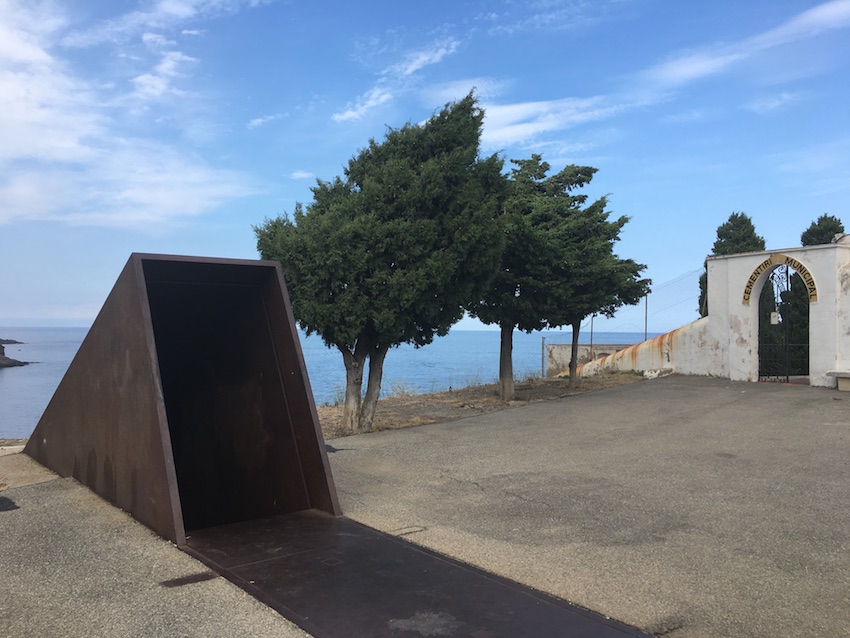27.09.2020 - 13:41
|
Actualització: 27.09.2020 - 15:41
“There is no document of civilization which is not at the same time a document of barbarism.” This quote is part of the German Jewish philosopher Walter Benjamin’s last masterpiece, ‘Theses on the Philosophy of History’ (1940), and, an ironic twist of fate, this would perfectly apply to him in Catalonia just months after writing it.
In 1940, he had already spent seven years in exile, ever since Adolf Hitler became the German chancellor. After spending time in Eivissa (Balearic Islands) France, Denmark, Italy and the US, Benjamin was living in France in early 1940. In May that year, Hitler’s troops began to advance firmly into France, and occupied Paris in June 14, with a myriad of aims, including arresting the philosopher.
Yet, they failed because Benjamin was able to escape the day before, moving south – and two months later he obtained a travel visa to enter the US. His plans to flee the Gestapo once and for all was leaving to the States from Portugal, crossing Spain, a neutral country during the war. Yet, at that time the fascist dictator Francisco Franco had just won the Spanish Civil War and was leading a bloody regime while somehow cooperating with Hitler.
Crossing the border
On September 25, 1940, he and some other German anti-Nazis began an infamous day-long walk to cross the mountainous French-Spanish border, from Banyuls and aiming to reach Portbou, the first town in the other side of the border. His health got worse during that effort – Lisa Fittko, one of his companions who used to help Germans cross the border, explained afterwards that Benjamin had to stop every ten minutes.
He arrived in Portbou in the evening, but some Francoist Spain police officers told him and his group that they were not allowed to be in Spain and that they would be deported back to France the day after. According to Angelus Novus foundation, which contributes to the memory of the writer, the orders for those police officers in Portbou had changed that day, and if they had crossed one day earlier, they would have been allowed to stay.
Indeed, the day after, Benjamin’s companions were allowed to continue their route – but the philosopher was found dead the morning of September 26 on his bed in ‘Hotel de Francia’, the guest house where they stayed that night in the northernmost Costa Brava town. He had died of a morphine overdose, so it has always been assumed that he committed suicide, seeing that his ultimate fate would be a Nazi camp and death.
Suicide?
“In a situation with no way out, I have no other choice. My life will end in a little village in the Pyrenees where nobody knows me. I ask you to pass on my thoughts to my friend Adorno and to explain the position I found myself in. I do not have enough time to write all the letters I would have liked to write.” This brief note was found in his belongings, which, according to Fittko, also included a legendary black suitcase containing an invaluable manuscript, which has never been found or declared by the judge who listed his possessions.
Yet, some locals have always questioned it, arguing that the local authorities might have cooperated with the Gestapo to hunt him. Another hypothesis suggests that Stalinist agents eliminated him, while others wonder why the local doctor declared that he had died of natural causes and was buried following the Catholic tradition –despite it being a suicide– in a rented niche with another name.
In 1941, his friend and also philosopher Hannah Arendt traveled to Portbou to find his burial place with no luck, nobody knew it – his remains were transferred to a mass grave in 1945, when the rental ended. Four years after dictator Franco’s death, in 1979, Benjamin’s memory began to be recovered in Portbou.
Memorial
The official paperwork declaring his death were found, and in 1994 a memorial called ‘Passages,’ by the Israeli sculptor Dani Karavan, was built, to honor the philosopher’s memory. The Catalan and German governments made it possible financially. The work not only honors him, but all humans going into exile seeking freedom, especially those fleeing from the Nazis. Declared a national interest monument by Catalonia, it also offers a unique view to the Mediterranean.
A 15-kilometer walking route across the border, between Banyuls and Portbou, also retraces Walter Benjamin’s footsteps. In early 2020, an ‘escape town’ game on his last day was also launched in the northern Catalan town. A center dedicated to his life and work in the seaside village has been planned, but the lack of funding has paralyzed the project.
In his ‘Passages’ monument, approximately where his remains are thought to lay, a plaque stands reading his celebrated quote, which also works as his epitaph: “There is no document of civilization which is not at the same time a document of barbarism.”


